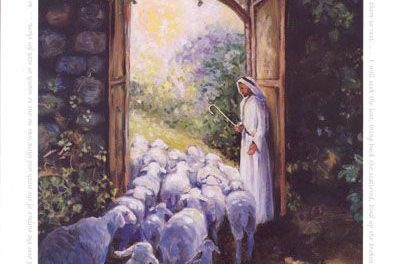Jesus explained that, the antidote to the greed and the fool in us as a person, church or nation is to be “rich toward God” (Lk 12:13-21). To make earthly gain, riches or pleasure primary desire and pursuit in life is a costly and fatal error that leads to decline and eternal loss (Lk 12:20-21). The key to understanding the parable of the rich fool says, “Take care, and be on your guard against all covetousness, for one’s life does not consist in the abundance of his possessions” (Lk 12:15, 21). Jesus finishes with these words: “This is how it will be with whoever stores up things for themselves but is not rich toward God.” The rich man’s foolishness is about his short-sightedness, self indulgence and self deception. The rich man deceptively thought he owned his possessions: “my crops, my barns, my grain, myself” thereby failed to know or accept that, ‘the Creator of the soil, his soul, and the harvest, was Almighty God. He failed to be rich toward God by living for himself. To be ‘rich toward God is the opposite of treating the self as though it were made for things and not for God.’ To be ‘rich toward God is the opposite of acting as if life consists in the abundance of possessions not in the abundance of knowing God.’ This parable is for our own times and culture, where seeking things – our rights, pleasure, ‘money and more money often turns us into fools who prepare our own downfall,’ decline and death.
The fool in us is shaped by our greed that makes us rebel against the truth of the Gospel ‘because we want to be in charge of our lives and our stuff.’ Our greed points to our choices of consuming, redefining, accumulating, and possessing desire – or love, joy, peace outside God’s Word. Jesus is warning us to be on our guard against all kinds of greed; for one’s life does not consist in the abundance of possessions. As the parable says, what really matters is making ourselves rich in the sight of God.
The context of this parable, a dispute two thousand years ago resonates with us today. Just as the people came to Jesus for his intervention over family problem, families still fight over money and property left by someone who had died. Someone in the crowd said to Jesus, “Teacher, tell my brother to divide the inheritance with me.” This is a request shaped by greed, self interest and grievance with others family members.
In disappointment, Jesus replied him, “Man, who appointed me a judge or an arbiter between you?” Jesus not only sense a lust for wealth at the heart of this family feud, Jesus warned about greed with a story of a super rich fool. This parable tells us, a rich man can be a fool. A rich nation can be a fool. A rich family or church can be a fool. A gifted leader or minister can be a fool. What make this super rich man a fool? Foolishness is acting in a way that is silly or irrational. Beyond being actually or apparently deficient in spiritual intelligence, to be a fool ‘implies the character of being or seeming unable to use judgment, discretion,’ or god sense.
Foolishness in this context is the hypocrisy, pride, unawareness or lack of spiritual norms which causes sin, offence, annoyance, trouble and/or injury. Foolishness is the result of a person misusing the intelligence God has given him or her. A fool uses his or her reasoning skills to make wrong decisions that are self- centred. The most basic type of foolishness is denying God’s existence or saying “no” to God and His words (Ps 14:1). A fool is quick temper and with perverse speech leads to ruin and decline (Prov 14:16-17; 19:1). Foolishness is always counterproductive (Prov 19:3). To the fool, God’s way is foolishness. “The message of the cross is foolishness to those who are perishing” (1 Cor 1:18, 23). On many levels, God’s plan and message do not make sense to the human way of thinking, hence, the Gospel seems to be foolishness to the unsaved because it doesn’t make sense to them. The fool like the rich man was completely out of phase with God’s wisdom.
Jesus’ warning is about foolishness, an unbalanced or wrongly focused life. It is possible like the man in the parable, our life and leadership can be consume by our wealth, pride, and our desire for pleasure. Like the man in the parable, many people and churches today, investing in human activities are declining in investing in God in truth and Spirit. Like the man in the parable, many hearts are giving to things and pleasures of this world when it ought to belong to God. Jesus’ response is about ‘redirecting our attentions and priority to the things above. All earthly things are vanity.’
The rich man’s problem of ‘me, me, me’ heart complex was based on his selfish, greedy, preoccupied mind set in contrast to God’s command. When God’s sense is missing, a fool falls below the godly norms. Vain is the ambition and planning of a fool nation, person or church ‘because that same night, he was to die.’ Vain is the theology that falls below the holiness of God. Decline and death has a way of clarifying missional matters.
Among the signs of a fool is pride with self-focus: “What should I do, for I have no place to store my crops?” “I will do this: I will pull down my barns and build larger ones, and there I will store all my grain and my goods. And I will say to my soul, ‘Soul, you have ample goods laid up for many years; relax, eat, drink, be merry’” (12:17-19). The lesson to the foolishness in each of us is that we must not fail to recognise God’s plan for eternal life (Lk 12:20). We are stewards for the time God has given us and not to rebel against God’s truth.
The parable of the rich fools warns that things don’t satisfy but only God. St Augustine wrote: “You have made us for yourself, O Lord, and our hearts are restless until they rest in you.” What are we, in fact, living for? In a culture with difficult demands to put things first rather than God, we are prone to “live down in sorrow,” decline, divisions, and frustrations.
The demands of our way of life can make it difficult to put first things first. Those who walk in the light of their own fires – who follow their own ideas and plans rather than submitting to God and what he has shown them through His Word – will “lie down in sorrow” (Is 50:10-11). Only in repentance from our greed and in our submission to the Lordship of Jesus Christ can we overcome the folly of thinking ‘things’ bring meaning to life; the folly of investing materially but not spiritually; and the folly of assuming assuming we know and own the future. Life is not having things. Life is knowing God.











Recent Comments